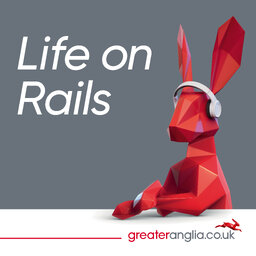How to Prepare for New Trains, Handle a Pantomime Dame and Save Money This Christmas
In this episode of Life On Rails, the podcast that takes you behind the scenes at Greater Anglia, we are back at Norwich Theatre Royal to speak to special guest, Dame Trott AKA actor Richard Gauntlett, from this year’s production of Jack and the Beanstalk. Dame Trott shares her love for the region before she is sent on a special surprise trip.
Head of Business Readiness, Keely Lopes, explains how the business prepared for its new trains, and we speak to train planning manager Ben Brandon, who explains how every train is timetabled.
Community and Customer Engagement Manager Alan Neville talks about the 300-strong team of station adopters who are brightening up stations across the network and helping to strengthen Greater Anglia’s sustainability credentials.
Hosts Juliette Maxam and Lucy Wright bust some myths about Christmas on the railway and issue advice to customers travelling over the festive period, while Fares Guru Ken Strong explains how people can save money on trips to London this festive season with the London Evening Out and London Night Out tickets.
We’d love to hear from you, please tweet us at @GreaterAngliaPR #LifeOnRails. Be sure to subscribe to the podcast as well, and visit www.greateranglia.co.uk/podcast to discover more. Thanks for listening!
 Life On Rails
Life On Rails


